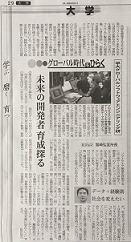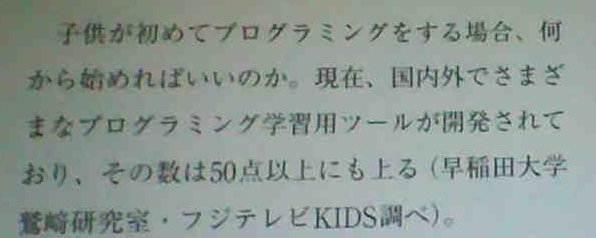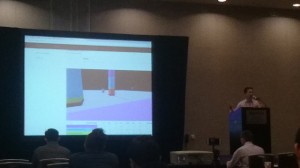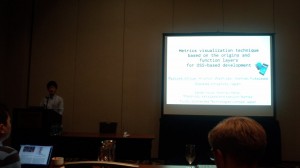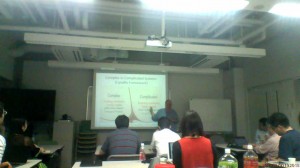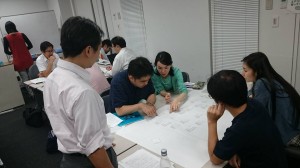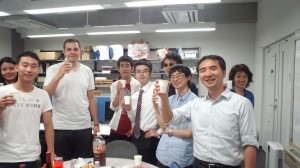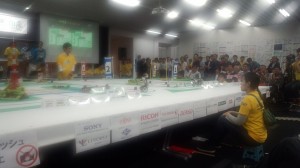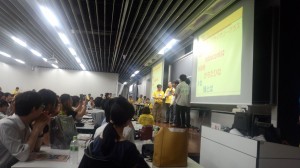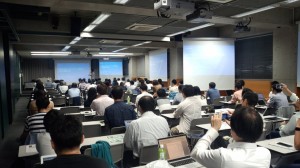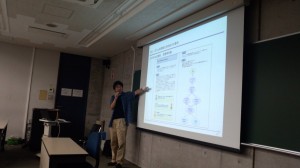日本経済新聞 11月2日朝刊にて早稲田大学グローバルソフトウェアエンジニアリング研究所の活動ならびに鷲崎教授のビジョンが掲載されました。ソフトウェア品質評価やアジャイル開発、パターン、プログラミング教育などを取り上げていただいています。詳しくはぜひ新聞紙面(電子版はこちら)をご覧ください。世の中のご期待に応えられるように、より一層、取り組んでまいりまして社会へと引き続き実質的に貢献してまいります。
日経トレンディ別冊「文系の親でもゼロからわかるプログラミング」、早稲田大学グローバルソフトウェアエンジニアリング研究所およびフジテレビKIDSによる調査結果への言及、2016年10月31日
10月5日の日本経済新聞 朝刊にプログラミング学習ツール調査研究の記事が掲載
On Oct 5, Nikkei newspaper reported our research activity and event on programming language learning tools.
10月5日の日本経済新聞 朝刊にプログラミング学習ツール調査研究の記事が掲載されました(電子版は以下)。チームとしては齋藤君や佐々木さんが進めている内容です。
グローバルソフトウェアエンジニアリング研究所(所長:鷲崎)とフジテレビKIDSによるプログラミング学習ツール体験・調査研究イベント G7 Programming Learning Summit 11月12日開催
早稲田大学グローバルソフトウェアエンジニアリング研究所(所長:鷲崎)と株式会社フジテレビKIDSの共同によりプログラミング学習ツール体験・調査研究イベント「G7 Programming Learning Summit」を11月12日に早稲田大学西早稲田キャンパスにて開催します。ぜひご参加ください。
Prof. Washizaki presented our paper titled A Taxonomy for Program Metamodels in Program Reverse Engineering at ICSME 2016 (CORE Rank A)
Prof. Washizaki presented our paper titled A Taxonomy for Program Metamodels in Program Reverse Engineering at ICSME 2016 (CORE Rank A).
Hironori Washizaki, Yann-Gael Gueheneuc, Foutse Khomh, “A Taxonomy for Program Metamodels in Program Reverse Engineering,” 32nd IEEE International Conference on Software Maintenance and Evolution (ICSME) (CORE Rank A), October 2-10, Raleigh, North Carolina, USA. (to appear) (acceptance rate 29%=37/127)
M0 Ryosuke Ishizue presented our paper titled Metrics visualization technique based on the origins and function layers for OSS-based development at VISSOFT 2016 (CORE Rank B)
M0 Ryosuke Ishizue presented our paper titled Metrics visualization technique based on the origins and function layers for OSS-based development at VISSOFT 2016 (CORE Rank B) on Oct 3. Video is available at https://www.facebook.com/ieeevissoft/videos/1121114641274995/
Ryosuke Ishizue, Hironori Washizaki, Yoshiaki Fukazawa, Sakae Inoue, Yoshiiku Hanai, Masanobu Kanazawa and Katsushi Namba, “Metrics visualization technique based on the origins and function layers for OSS-based development,” 4th IEEE Working Conference on Software Visualization (VISSOFT 2016), NIER Track, Raleigh, North Carolina, USA, October 3-4, 2016. (CORE Rank B)(to appear)
特別セミナー「アジャイル品質と引継ぎパターン」 を成功裏に終了(2016年9月30日)
Joseph Yoder氏を招聘して特別セミナー「アジャイル品質と引継ぎパターン」 を9月30日に成功裏に開催しました。多くのご参加をいただき有難うございました。セミナー当日のスライド資料を公開しましたのでセミナー紹介ページから参照ください。また近日中に、引継ぎパターンのワークショップの結果を追加掲載する予定です。多くのパターン間の関係、ならびに新たなパターン候補を識別いただきました。
主催: 早稲田大学グローバルソフトウェアエンジニアリング研究所(スーパーグローバル大学創成支援 SGU Waseda Ocean ICT・ロボット工学拠点 参画)
日時: 2016年9月30日(金)19:00-21:00
場所: 早稲田大学 西早稲田キャンパス 63号館 5階 0506会議室
資料等詳細: セミナー紹介ページ
4+ students joined our group this September. Welcome!
ETロボコン2016東京地区大会をグローバルソフトウェアエンジニアリング研究所が9月18-19日に西早稲田キャンパスにて共催
XP祭り2016をグローバルソフトウェアエンジニアリング研究所(所長: 鷲崎教授)が共催
アジャイル開発や周辺に関するコミュニティイベント XP祭り2016 をグローバルソフトウェアエンジニアリング研究所(所長: 鷲崎教授)が早稲田大学西早稲田キャンパスにて9月24日に共催しました。当日は200名の参加があり大変盛況な会となりました。また鷲崎教授はシステム情報 小林氏と共同で、下記のワークショップを実施しました。ご参加ご協力、有難うございました。
鷲崎弘宜、小林浩、“マルチディメンショナル・レトロスペクティブ – SEMATの7つの視点で気づきの多い多面的な振り返り -“, XP祭り2016、早稲田大学、2016年9月24日
